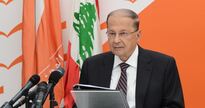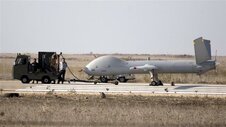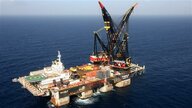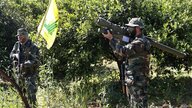3 dec 2019

Naftali Bennett, Israel's interim defence minister
Defence Minister Naftali Bennett describes the order as 'economic persecution' aimed at limiting activists from accessing assets
Israel’s defence ministry has issued an administrative order to set up a database of Palestinian and Arab activists and target their financial activities in Israel and abroad, Yisrael Hayom newspaper reported on Tuesday.
Naftali Bennett, Israel's interim defence minister, described the order as “economic persecution” aimed at limiting activists from accessing assets and managing their finances. He said the move was part of a “war on terrorism”.
The order is the first of its kind in Israel, according to Yisrael Hayom. The database will be available for other countries to use and fully accessible to the public, the paper reported.
It will include the names of hundreds of individuals allegedly linked to the Palestinian Hamas movement and Hezbollah in Lebanon.
The order, Yisrael Hayom said, is part of a widescale plan by Israel’s defence ministry to set up non-military means, predominantly economic, to target political groups that it deems “terrorist”.
According to Israeli media, one of those targeted by the order is prominent Palestinian lawyer Mohammed Jamil Hersh, president of the Arab Organisation for Human Rights in the UK.
When asked by Middle East Eye to comment on the reports, he declined.
In the past, Israel accused the lawyer, commonly known simply as Mohammed Jamil, of being a member of Hamas.
In 1992, Israel expelled him to south Lebanon along with hundreds of Palestinians who had worked as activists during the First Palestinian Intifada of 1987.
Today Jamil primarily works on human rights and with international bodies such as the International Criminal Court, whose chief prosecutor Fatou Bensouda is looking into opening an official investigation into crimes committed by Israel in the Gaza Strip.
Defence Minister Naftali Bennett describes the order as 'economic persecution' aimed at limiting activists from accessing assets
Israel’s defence ministry has issued an administrative order to set up a database of Palestinian and Arab activists and target their financial activities in Israel and abroad, Yisrael Hayom newspaper reported on Tuesday.
Naftali Bennett, Israel's interim defence minister, described the order as “economic persecution” aimed at limiting activists from accessing assets and managing their finances. He said the move was part of a “war on terrorism”.
The order is the first of its kind in Israel, according to Yisrael Hayom. The database will be available for other countries to use and fully accessible to the public, the paper reported.
It will include the names of hundreds of individuals allegedly linked to the Palestinian Hamas movement and Hezbollah in Lebanon.
The order, Yisrael Hayom said, is part of a widescale plan by Israel’s defence ministry to set up non-military means, predominantly economic, to target political groups that it deems “terrorist”.
According to Israeli media, one of those targeted by the order is prominent Palestinian lawyer Mohammed Jamil Hersh, president of the Arab Organisation for Human Rights in the UK.
When asked by Middle East Eye to comment on the reports, he declined.
In the past, Israel accused the lawyer, commonly known simply as Mohammed Jamil, of being a member of Hamas.
In 1992, Israel expelled him to south Lebanon along with hundreds of Palestinians who had worked as activists during the First Palestinian Intifada of 1987.
Today Jamil primarily works on human rights and with international bodies such as the International Criminal Court, whose chief prosecutor Fatou Bensouda is looking into opening an official investigation into crimes committed by Israel in the Gaza Strip.
15 oct 2019

Lebanese president Michel Aoun has accused Israel of violating all international laws, conventions and norms and seeking to impose a new fait accompli on the ground.
Aoun made the remarks at the first conference of the Levant meeting, entitled: "Meeting and a Breakfast Prayer, Lebanon the Homeland of Dialogue and Civilizations", which was held in Beirut.
The president strongly denounced the US recognition of Jerusalem as Israel’s capital and its exposure to Judaization as “a flagrant violation of all international laws and resolutions, and a dangerous indicator of something being prepared.”
He said that Israel’s violations include settlement expansion, racist legislation and its disrespect for the inviolability of internationally recognized borders.
Aoun made the remarks at the first conference of the Levant meeting, entitled: "Meeting and a Breakfast Prayer, Lebanon the Homeland of Dialogue and Civilizations", which was held in Beirut.
The president strongly denounced the US recognition of Jerusalem as Israel’s capital and its exposure to Judaization as “a flagrant violation of all international laws and resolutions, and a dangerous indicator of something being prepared.”
He said that Israel’s violations include settlement expansion, racist legislation and its disrespect for the inviolability of internationally recognized borders.
9 sept 2019

Israel has claimed a drone attack on Iraqi forces and members of the Lebanese resistance movement Hezbollah near Syria's border with Iraq.
The so-called Syrian Observatory for Human Rights (SOHR) said the attack took place in the early hours of Monday, when unnamed aircraft opened fire on alleged gatherings of Lebanese and Iraqi fighters in the Syrian city of Boukamal, east of Dayr al-Zawr province.
Syrian sources, including the state-run al-Ikhbariyah Syria television, confirmed that the attack had indeed targeted Iraqi and Lebanese forces.
Hours later, the Israeli military took responsibility, claiming that it had carried out the drone attack against forces allegedly attempting to fire rockets into Israel overnight.
The London-based SOHR, which is linked to foreign-backed militants in Syria, claimed that at least 18 people were killed in the attack.
The drone strike comes amid the Israeli regime's renewed campaign of aggression against several countries in the region -- including Syria, Iraq and Lebanon.
The regime on August 24 targeted Hezbollah structures in the Syrian capital of Damascus, killing two members of the Lebanese movement. It also attempted to attack Beirut the next day but lost two drones over the Lebanese capital.
Hezbollah vowed swift retaliation back then, a promise that it took only days to fulfill.
On September 1, Hezbollah fighters targeted an Israeli military vehicle and several military bases along Lebanon's border with the occupied territories.
Hezbollah also announced early Monday that it had shot down another intruding Israeli drone.
Israel has on several occasions also targeted Iraqi Popular Mobilization Units (PMU), or Hashd al-Sha'abi.
The PMU, after purging Iraqi lands from Daesh and other foreign-backed militants, has been working with Syria to secure border areas between the two countries.
The attack on Monday came amid reports that Syrian and Iraqi officials are working to reopen a key border crossing that connects Boukamal to Iraq's al-Qaim as they continue to forge greater relations.
On Sunday, Iraq called for the return of Syria to the Arab League as the group opened its 152nd session in Cairo, Egypt.
The Arab League froze Syria's seat in 2011, at the onset of what would become a years-long war against foreign-backed militancy.
However, more Arab countries have called for normalization of ties with Syria and the government of President Bashar al-Assad, who has been able to push militants out of most of his country thanks to help from Russia, Iran and Hezbollah.
The so-called Syrian Observatory for Human Rights (SOHR) said the attack took place in the early hours of Monday, when unnamed aircraft opened fire on alleged gatherings of Lebanese and Iraqi fighters in the Syrian city of Boukamal, east of Dayr al-Zawr province.
Syrian sources, including the state-run al-Ikhbariyah Syria television, confirmed that the attack had indeed targeted Iraqi and Lebanese forces.
Hours later, the Israeli military took responsibility, claiming that it had carried out the drone attack against forces allegedly attempting to fire rockets into Israel overnight.
The London-based SOHR, which is linked to foreign-backed militants in Syria, claimed that at least 18 people were killed in the attack.
The drone strike comes amid the Israeli regime's renewed campaign of aggression against several countries in the region -- including Syria, Iraq and Lebanon.
The regime on August 24 targeted Hezbollah structures in the Syrian capital of Damascus, killing two members of the Lebanese movement. It also attempted to attack Beirut the next day but lost two drones over the Lebanese capital.
Hezbollah vowed swift retaliation back then, a promise that it took only days to fulfill.
On September 1, Hezbollah fighters targeted an Israeli military vehicle and several military bases along Lebanon's border with the occupied territories.
Hezbollah also announced early Monday that it had shot down another intruding Israeli drone.
Israel has on several occasions also targeted Iraqi Popular Mobilization Units (PMU), or Hashd al-Sha'abi.
The PMU, after purging Iraqi lands from Daesh and other foreign-backed militants, has been working with Syria to secure border areas between the two countries.
The attack on Monday came amid reports that Syrian and Iraqi officials are working to reopen a key border crossing that connects Boukamal to Iraq's al-Qaim as they continue to forge greater relations.
On Sunday, Iraq called for the return of Syria to the Arab League as the group opened its 152nd session in Cairo, Egypt.
The Arab League froze Syria's seat in 2011, at the onset of what would become a years-long war against foreign-backed militancy.
However, more Arab countries have called for normalization of ties with Syria and the government of President Bashar al-Assad, who has been able to push militants out of most of his country thanks to help from Russia, Iran and Hezbollah.

This file picture taken on January 31, 2019 shows an aerial view of the SSCV Thialf crane vessel laying the newly-arrived foundation platform for the Leviathan natural gas field in the Mediterranean Sea, about 130 kilometers (81 miles) west of the coast of the Israeli city of Haifa
Israel has struck a deal with Egypt to use a gas terminal in Ashkelon for exports of gas to the Arab country, despite opposition from Lebanon which views the reserves as stolen.
The arrangement reached on Sunday removed one of the final hurdles before Israel could begin selling gas to Egypt in a $15 billion export deal, the two sides said.
The gas will be supplied via a 90 km-long subsea pipeline that connects Ashkelon to el-Arish in Egypt’s Sinai peninsula, but first the gas must pass through the Israeli terminal in Ashkelon.
Israel looks at Jordan and Egypt as the potential buyers of gas which it claims to have found in the eastern Mediterranean. Egypt's trade with Israel is larger than its trade with some Arab countries.
The reserves, discovered in the eastern Mediterranean Levant Basin since 2009, straddle the territories of several countries - including Cyprus, Greece, Egypt, Lebanon and Syria - whose relations are strained on a number of fronts.
Lebanon has warned its Mediterranean neighbors that a planned gas pipeline from Israel to the European Union must not be allowed to violate its maritime borders.
Beirut has an unresolved maritime border dispute with Israel over a sea area of about 860 sq km extending along the edge of three of Lebanon’s southern energy blocks.
Israel is hoping to enlist several European countries in the construction of a 2,000 km pipeline linking vast eastern Mediterranean gas resources to Europe through Cyprus, Greece and Italy at a cost of $7 billion.
Lebanese Parliament Speaker Nabih Berri said in February that Israel was seeking to steal Lebanon’s oil and gas reserves.
Lebanese sources have said the region where Israel claims to have made the find lies mostly off the Lebanese shores and in international waters between the sea border of Palestine and Cyprus.
Egypt's gas trade with Israel
Before 2012, Israel imported natural gas from Egypt; though the pipeline, running through the restive Sinai Peninsula, was dogged by frequent attacks.
The sale of gas to Israel, which signed a peace treaty with Egypt in 1979 after four wars, was always controversial in the Arab world’s most populous country.
The deal, initially slated to last 20 years, was finally canceled by Egyptian authorities following the 2012 ouster of president Hosni Mubarak.
The cancellation put the official stamp on the end of the bilateral gas deal. Several senior petroleum officials under Mubarak, including his oil minister Sameh Fahmy, were also sentenced to between three and 15 years in jail for selling natural gas at below-market prices.
However, they were all acquitted when former defense minister and army chief Abdel-Fattah el-Sisi, who oversaw the ousting of Egypt’s first democratically-elected president, came to power.
Other than Jordan, Egypt is the only Arab nation with formal relations with Israel under a peace treaty signed by former president Anwar Sadat in 1979.
Sisi once claimed he was approached in a dream by Sadat and was told by the former leader he would rule Egypt some day.
In a leaked recording of an interview with a reporter for Egypt daily al-Masry al-Youm in 2013, Sisi is heard recounting his fantastical conversation with Sadat, who was assassinated in 1981.
Israel has struck a deal with Egypt to use a gas terminal in Ashkelon for exports of gas to the Arab country, despite opposition from Lebanon which views the reserves as stolen.
The arrangement reached on Sunday removed one of the final hurdles before Israel could begin selling gas to Egypt in a $15 billion export deal, the two sides said.
The gas will be supplied via a 90 km-long subsea pipeline that connects Ashkelon to el-Arish in Egypt’s Sinai peninsula, but first the gas must pass through the Israeli terminal in Ashkelon.
Israel looks at Jordan and Egypt as the potential buyers of gas which it claims to have found in the eastern Mediterranean. Egypt's trade with Israel is larger than its trade with some Arab countries.
The reserves, discovered in the eastern Mediterranean Levant Basin since 2009, straddle the territories of several countries - including Cyprus, Greece, Egypt, Lebanon and Syria - whose relations are strained on a number of fronts.
Lebanon has warned its Mediterranean neighbors that a planned gas pipeline from Israel to the European Union must not be allowed to violate its maritime borders.
Beirut has an unresolved maritime border dispute with Israel over a sea area of about 860 sq km extending along the edge of three of Lebanon’s southern energy blocks.
Israel is hoping to enlist several European countries in the construction of a 2,000 km pipeline linking vast eastern Mediterranean gas resources to Europe through Cyprus, Greece and Italy at a cost of $7 billion.
Lebanese Parliament Speaker Nabih Berri said in February that Israel was seeking to steal Lebanon’s oil and gas reserves.
Lebanese sources have said the region where Israel claims to have made the find lies mostly off the Lebanese shores and in international waters between the sea border of Palestine and Cyprus.
Egypt's gas trade with Israel
Before 2012, Israel imported natural gas from Egypt; though the pipeline, running through the restive Sinai Peninsula, was dogged by frequent attacks.
The sale of gas to Israel, which signed a peace treaty with Egypt in 1979 after four wars, was always controversial in the Arab world’s most populous country.
The deal, initially slated to last 20 years, was finally canceled by Egyptian authorities following the 2012 ouster of president Hosni Mubarak.
The cancellation put the official stamp on the end of the bilateral gas deal. Several senior petroleum officials under Mubarak, including his oil minister Sameh Fahmy, were also sentenced to between three and 15 years in jail for selling natural gas at below-market prices.
However, they were all acquitted when former defense minister and army chief Abdel-Fattah el-Sisi, who oversaw the ousting of Egypt’s first democratically-elected president, came to power.
Other than Jordan, Egypt is the only Arab nation with formal relations with Israel under a peace treaty signed by former president Anwar Sadat in 1979.
Sisi once claimed he was approached in a dream by Sadat and was told by the former leader he would rule Egypt some day.
In a leaked recording of an interview with a reporter for Egypt daily al-Masry al-Youm in 2013, Sisi is heard recounting his fantastical conversation with Sadat, who was assassinated in 1981.

The Lebanese resistance movement Hezbollah has shot down an Israeli military drone outside the southern town of Ramyah.
Hezbollah said its air defense forces shot down the aircraft early Monday as it crossed the border between Lebanon and the occupied Palestinian lands.
The resistance group noted that it had already captured the Israeli drone's remains.
The Israeli military also confirmed that it had lost a "small drone" in Lebanon but said that the aircraft had crashed and had not been targeted.
The Tel Aviv regime also downplayed the fact that Hezbollah was holding the aircraft's wreckage, saying it contained no sensitive intelligence on board.
The development comes amid heightened tensions between Hezbollah and the Israeli military.
The rift began after the Tel Aviv regime targeted Hezbollah's positions in the Syrian capital of Damascus on August 24, killing two of the group's members.
The following day, Hezbollah said two Israeli drones had been destroyed near the Lebanese capital of Beirut.
Hezbollah pledged a swift response along the border and said that it would also shoot down any intruding Israeli drone in the future.
Tensions peaked last Sunday, when Hezbollah fired anti-tank missiles at an Israeli military vehicle along the border with the occupied territories and attacked several Israeli bases as well.
Israel continued its aggression by shelling some Lebanese territories before relative calm returned the next day.
(This item is being updated.)
Hezbollah said its air defense forces shot down the aircraft early Monday as it crossed the border between Lebanon and the occupied Palestinian lands.
The resistance group noted that it had already captured the Israeli drone's remains.
The Israeli military also confirmed that it had lost a "small drone" in Lebanon but said that the aircraft had crashed and had not been targeted.
The Tel Aviv regime also downplayed the fact that Hezbollah was holding the aircraft's wreckage, saying it contained no sensitive intelligence on board.
The development comes amid heightened tensions between Hezbollah and the Israeli military.
The rift began after the Tel Aviv regime targeted Hezbollah's positions in the Syrian capital of Damascus on August 24, killing two of the group's members.
The following day, Hezbollah said two Israeli drones had been destroyed near the Lebanese capital of Beirut.
Hezbollah pledged a swift response along the border and said that it would also shoot down any intruding Israeli drone in the future.
Tensions peaked last Sunday, when Hezbollah fired anti-tank missiles at an Israeli military vehicle along the border with the occupied territories and attacked several Israeli bases as well.
Israel continued its aggression by shelling some Lebanese territories before relative calm returned the next day.
(This item is being updated.)
